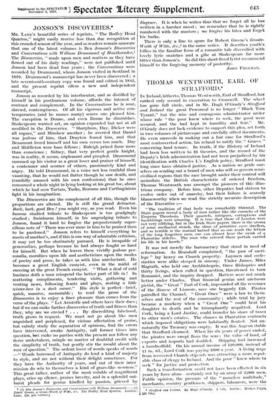JO SON'S DISCOVERIES.*
Mn. LANE'S beautiful series of reprints, "The Bodley Head Quartos," might easily receive less than due recognition at this crowded season of the year, and so readers remain unaware that one of the latest volumes is Ben Jonson's Discoveries and Conversations with William Drummond of Hawthorn den.' The Discoveries, made upon men and matters as they have flowed out of his daily readings," were not published until Jonson had been dead four years ; the Conversations were recorded by Drummond, whom Jonson visited in Scotland in 1619. , Drummond's manuscript has never been discovered ; a late seventeenth-century copy was found and edited in 1842, and the present reprint offers a new and independent transcript.
Jonson as recorded by his interlocutor, and as distilled by himself in his posthumous volume, affords the interest of contrast and complement. In the Conversations he is sour, shrewd, contemptuous. Of all his vigorous and active con- temporaries (and he names many) scarce one pleased him. The exception is Donne, and even Donne he diminishes. Shakespeare wanted art, an opinion expanded but not at all modified in the Discoveries. " Sharpham, Day, Dicker were all rogues," and Minshew another ; he averred that Daniel was jealous of him, that Drayton feared him, and that Beaumont loved himself and his own verses too much. Day and Middleton were base fellows ; Raleigh prized fame more than conscience ; Sidney, that very perfect gentle knight, was in reality, it seems, unpleasant and pimpled. Drummond summed up his visitor as a great lover and praiser of himself, a contemner and scorner of others, passionately kind and angry. He told Drummond, in a voice not less truthful than vaunting, that he would not flatter though he saw death, and (candidly amused with his own confessions) that he once consumed a whole night in lying looking at his great toe, about which he had seen Tartars, Turks, Romans and Carthaginians fight in his imagination.
The Discoveries are the complement of all this, though the proportions are altered. He is still the grand detractor. Bark, bark, good Ben ! you might cry, as you read. Even his famous studied tribute to Shakespeare is too grudgingly studied ; Swinburne himself, in his ungrudging tribute to Jonson, found it hard to forgive the preposterously super- cilious note of" There was ever more in him to be praised than to be pardoned." Jonson refers to himself everything he meets of another's, and if this is one way of admirable criticism, it may yet be too obstinately pursued. He is incapable of generosities, perhaps because he had always fought so hard for himself. But when he leaves these vividly jealous per- sonalia, moralizes upon life and aestheticizes upon the modes of poetry and prose, he takes us with him unreluctant. He becomes a great English essayist, even in the midst of sneering at the great French essayist. "'What a deal of cold business doth a man misspend the better part of life in ! In scattering compliments, tendering visits, gathering and venting news, following feasts and plays, making a little winter-love in a dark corner." His style is perfect—brief, quick, massive, memorable ; to read the prose of the Discoveries is to enjoy a finer pleasure than comes from the verse of the plays. "Let Aristotle and others have their dues ; but if we can make further discoveries of truth and fitness than they, why are we envied ? . . . By discrediting falsehood, truth grows in request. We must not go about like men anguished and perplexed, for vicious affectation of praise, but calmly study the separation of opinions, find the errors have intervened, awake Antiquity, call former times into question, hat make no parties with the present nor follow any fierce undertakers, mingle no matter of doubtful credit with the simplicity of truth, but gently stir the mould about the root of question." The ardent lover of words speaks of words —" VVords borrowed of Antiquity do lend a kind of majesty to style, and are not without their delight sometimes. For
they have the Authority of years, and out of their inter mission do win to themselves a kind of grace-like newness."
This great talker, author of the most voluble of magnificent plays, cries up silence, praises brevity, and in a splendid out- burst pleads for genius kindled by passion, grieved by
• (1) Ben Jonson's Diecoveries and Conversations with William Drummond.—(2) Robert Greene, a Groate-Worth of Wide, rd.c. The Bodley Head Quartos. London Lane. Os. per volume.]
disgrace. It is when he writes thus that we forget all he has written in a harsher mood ; we remember that he is rightly numbered with the masters ; we forgive his bites and forget his barks.
There is only a line to spare for Robert Greene's Groats- Worth of Witte, cPc.,2 in the same series. It describes youth's follies in the familiar form of a romantic tale diversified with lovely lyric snatches and a gibe at Shakespeare far more bitter than Jonson's. So did this short-lived lyrist recommend himself to the forgiving memory of posterity.
JOHN FREEMAN.


























































 Previous page
Previous page